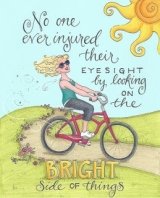|
What we feed our bodies feeds our eyes.
Many of the vitamins and minerals in our bodies are found in much higher concentrations in our eyes, so a diet lacking in these vitamins and minerals can lead to vision problems as we grow older. Take the time every day to give your eyes (and the rest of your body) the nutritive support they need. Eat the foods and take the supplements that provide the antioxidant vitamins and minerals your eyes require. You’ll Protect Your Eyesight, ensuring years of good eye health, and increasing the odds that you’ll avoid blindness or vision loss for the rest of your life. If you find this newsletter useful, please do a friend and us a big favor and "pay it forward." Forward this issue to all your friends. If a friend passed this issue along to you, and you like what you read, please subscribe by visiting... Protect Your Eyesight Do You Have a Vision Story That You Can Share? I need your help. I have a page on this website that is for my readers to tell their Eyesight story. My hope was to have people tell their story so it might help someone else with the same problem or experience. But lately there has not been any activity on this page. Could you please look at this page and contribute someone if you can. Thank You Do You Have a Story That Could help Someone Else? Click Here
Table of ContentsA New Visual Discovery Light in the Dark: A New Visual Discovery The discovery of an optic nerve that responds to light and dark—but not through vision—has proven that light does more than help us see. Studying blind subjects, scientists at Brigham and Women's Hospital and Harvard Medical School have shown that the eye detects light for other purposes, such as resetting the body’s internal clock to a 24-hour day; when exposed to bright light, the subjects exhibited biological responses such as changes in hormone levels, pupil constriction and changes in brain function. Not only that, but stimulation of the eye’s retinal ganglion cells that are most sensitive to short-wavelength blue light brought about a visual awareness of light in these blind subjects, calling into question the traditional view that rods and cones are responsible for all visual responses to light. Dr. Steven Lockley, the lead author of the study and a researcher in Brigham and Women's Hospital's Division of Sleep Medicine, says research into the new field of lighting and health is just beginning: "People have been studying the eyes for hundreds of years and thought that they knew everything. ... [But] in the past five to 10 years, we've discovered a whole new photoreceptor system, a whole new way of detecting light in the eye which isn't in the parts of the eye which we were traditionally used to seeing. So we have to start to rethink all of our concepts about how light affects the brain, about how our eyes see light, what our eyes are designed to do. Because this whole new approach to a photoreceptor system isn't related to vision and is there entirely to tell us what time of day it is essentially in the outside world." The implications of this discovery for human health are important and wide-ranging. From designing office buildings to allow maximum admission of natural light into a space in order to reduce or eliminate electric lighting (called "daylighting") to the possible link between light pollution and cancer, there are many areas in which scientists are making breakthroughs. One direct result of the Brigham and Women's Hospital study is blue light therapy, a treatment for patients with circadian rhythm disorders. The magazine Neuropsychiatry Reviews points out that traditional treatment of patients with circadian rhythm disorders (upsets in the body’s internal clock, which regulates sleep patterns and other physiological and behavioral functions) has been based on the premise that the body’s clock only responds to bright light at a certain time of day. The fact that lower-intensity, short-wavelength blue light has been shown to be more effective than the most visible kinds of light in that regard could mean that blue light therapy may help patients improve alertness during shift work, overcome jet lag, and even help resolve circadian disruptions in astronauts during space flights. In tests comparing the effects of blue and green light, subjects exposed to blue light were less sleepy and more alert. They also had quicker reaction times and fewer lapses in attention than those exposed to green light. Although more research needs to be done, "these results suggest that light may be a powerful countermeasure to the negative effects of fatigue for people who work at night," said Dr. Lockley. "With the advent of new, more controllable lighting technologies, we can begin to develop ‘smart’ lighting systems designed to maximize the beneficial effects of light for human health." Protect Your eyes, Your Eyes will thank you.
Comments? Ideas? Feedback? We want to hear from you with your complaints, compliments or suggestions. That's the only way we can make EyeSight Vision Care! more useful for you. Have something to tell us? Click on Reply in the menu and tell us what you think! |
More Information
Vision Training for GOLF...
"Everything you wanted to know about how your eyesight affects your game, with self tests and tips to aid alignment, reading greens and judging speed and distance. Much more fascinating than it sounds."- Golf Magazine - Click Here!




